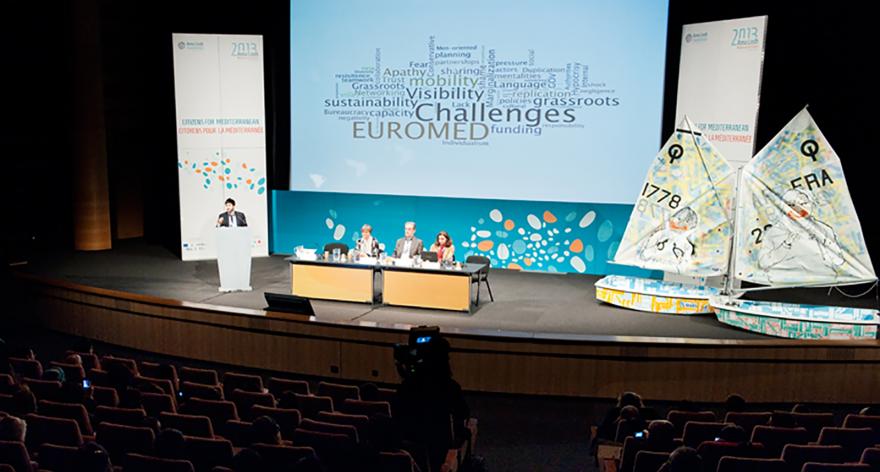
“The Anna Lindh Forum has been a great success at this historic moment for building a union across the Mediterranean. The re-launching of Euro-Med Dialogue must centre on the mobilisation of civil society and the citizens for the Mediterranean.”
Martin Schulz, President of the European Parliament
Second MedForum “Anna Lindh Mediterranean Forum”, April 4-7, 2013, Marseille, France
The second edition of the Anna Lindh Mediterranean Forum took place from 4th to 7th April in the French city of Marseille, the “European Capital of Culture” for 2013 at the Venue Pharo Palace.
The Anna Lindh Mediterranean Forum brought together more than 1500 civil society organizations from 44 countries of the Euro-Mediterranean region. Held under the banner ‘Citizens for the Mediterranean’, the Forum opened the floor for interaction, exchange, and debate surrounding the top issues facing the Euro-Med region today, developing concrete plans for a better partnership across the region. Among its key conclusions, partners proposed to launch an “Annual Week of the Mediterranean”, where the voices and joint actions of citizens, parliaments, local authorities, and civil society will be shared.
Built on the successful first edition held in Barcelona, the agenda of the Forum has been conceived from a bottom-up approach through a series of preparation meetings involving the Anna Lindh National Networks and civil society groups, on ‘Youth’ (Istanbul and Luxemburg); ‘Women’ (Casablanca); ‘Migration’ (Algeria); ‘Institutional Cooperation’ (Cairo); ‘Social Movement’ and ‘Media’ (Barcelona). The Forum was a threefold format event:
- the AGORA (strategic debates and advocacy);
- the MEDINA (good practices and project ideas);
- the INTERCULTURAL FAIR (networking and exchange).
The forum reached a number of basic recommendations under the theme of Building Inclusive Citizenship across the Region. This included:
- Civil Society should play a more organized role as a watchdog of power and of institution building, to teach and popularise the essence of election processes and to develop mechanisms for structured dialogue between civil society and government.
- The Euro-Med region needs to strengthen inclusive citizenship incorporation as a normative principle of high relevance for cooperation and intercultural dialogue.
- Investing in people is the prevailing modality of ALF programming as in this context, Arts for Change was addressed through multiple testimonies as a way of contributing to social cohesion.
- Building a ‘Memory for the future’ is important in order to resist pressure for regression. Knowing the history of one’s country and of the country of residence provides a necessary basis, and should be more explicitly included in activities of ALF networks as well as of ALF programs.
- Successful work requires mobility for Euro-Med citizens in order to allow for the manifold peer-to-peer cross-culture activities (between teachers and pupils, among students, among journalists as well as for artists-in-residence). An efficient Euro-Med youth platform is needed.
- Participants and experts also identified the common challenges in Practicing Dialogue that needs to be addressed in order to be able to build inclusive citizenship across the region. These participants identified the following:
- Mobility: While promoting dialogue and intercultural exchange is a top priority for the ALF and partner organizations, however, mobility across the Mediterranean remains a major challenge. Obtaining visas and high mobility costs are the most relevant challenges in this regard.
- Visibility: Civil society actions across the Euro-Mediterranean often remain hidden from the public eye. The lack of visibility is due to limited outreach and media outlets, thus the incorporation of new outreach tools and mechanisms were identified as challenges.
- Grassroots: Civil society is struggling to work at the grassroots level and become accessible to all members of society.
- Youth Inclusion: Youth is structurally excluded from civil society processes. Young people are not effectively reached, and the relationship of civil society with the youth population is limited.
- Sustainability and Funding: Organisations struggle with finding the appropriate mechanisms to sustain their work and find continued funding.
- Local authorities’ bureaucracy and collaboration. Non-governmental organizations and groups in civil society are not working as effectively as they could due to restrictive laws and the security apparatus, in particular in Southern countries.
Language barriers restrict mobility and intercultural actions in the Euro-Mediterranean region. Due to those barriers, it is often the highly educated youth who are able to speak and understand multiple languages, that participate in exchanges across borders. Exchange, therefore, remains primarily the privilege of the upper social classes, while youth from marginalized communities are left out.
Pictures:
- https://www.flickr.com/photos/annalindh/albums/72157633204013274
- https://www.flickr.com/photos/annalindh/albums/72157633199342935
- https://www.flickr.com/photos/annalindh/albums/72157633204129484
- https://www.flickr.com/photos/annalindh/albums/72157633204156794